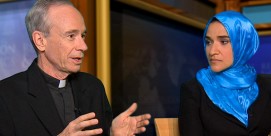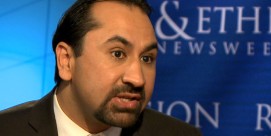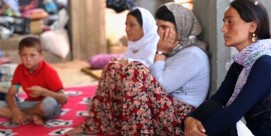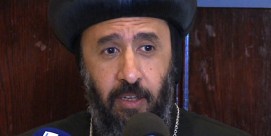Ethics and the Shadow of Torture
by David E. Anderson
“The Christian in me says it’s wrong, but the corrections officer in me says ‘I love to make a grown man piss himself.'” — Charles A. Graner, Jr. on the torture of prisoners at Abu Ghraib
President Bush’s nomination of his White House counsel Alberto R. Gonzales to succeed John Ashcroft as attorney general will almost certainly — at least briefly — once again raise the shadow of torture and whether or not the United States not only practices it but also condones it at the highest level of the government.
It’s an ethical shadow dramatically underscored by the comment of Spec. Charles Graner, alleged to be one of the key ringleaders in the abuse at the Abu Ghraib prison. The public revelations of the abuse and subsequent investigations and leaks of administration documents, including memos by Gonzales, touched off the first but short-lived debate on the ethics of torture.
But whether the Senate confirmation hearings on Gonzales will generate anything more than a superficial probing by the Senate and circumspect dancing around the complex and difficult ethical questions (to some) by the nation’s public intellectuals — those pundits and ethicists whose task it is to inform debate and discussion on such issues in civil society — remains an open question.
Gonzales’s confirmation hearing could spark such a renewed debate, because he is the author of a controversial memorandum to Bush labeling provisions of the Geneva Convention on the treatment of prisoners of war “obsolete” and “quaint.” In his view, the attacks on Washington and New York on September 11, 2001, and Bush’s subsequent declaration of a “a new kind of war — the ‘war on terrorism'” — created a “new paradigm” essentially requiring that the government be given carte blanche in pursuing the nation’s enemies.
Almost certain to deepen the controversy was a story in the November 30 editions of THE NEW YORK TIMES reporting that the International Committee of the Red Cross has told the U.S. government that the interrogation techniques used on the more than 500 detainees at the Guantanamo prison in Cuba are “tantamount to torture.”
In addition, the ICRC report, based on a lengthy visit to the prison in June, also said some doctors and medical personnel were participating in planning for interrogations in what it called “a flagrant violation of medical ethics.” The U.S. government, which received the report in July, has sharply rejected the charges, the TIMES reported.
Additionally, the more aggressive U.S. military operations in Iraq in recent weeks have generated a new surge in detainees, nearly doubling the number previously held to some 8,300, according to news reports.
THE WASHINGTON POST reported on November 27 that the increase in detainees is providing the biggest test yet of new facilities and procedures adopted in the wake of the Abu Ghraib prison torture cases that sparked the first brief debate on torture last spring.
At the same time, a British Foreign Office official has told the United Nations antitorture panel that Britain has frequently expressed concern to the U.S. government about U.S. troops allegedly mistreating Iraqis as recently as October.
“The (UN) committee can be assured that we have raised allegations of mistreatment involving US military personnel brought to our attention at the earliest opportunity,” Audrey Glover told the committee, Agence France-Presse reported November 19.
The 2002 Gonzales memo sought to resolve for Bush a dispute between the State Department, which said determination of Geneva Convention status for Taliban and Al Qaeda prisoners should be made on a case-by-case basis, and Ashcroft’s Department of Justice, which argued no such protections existed. It apparently did — in Justice’s favor.
On February 7, 2002, Bush, in what scholar and journalist Mark Danner has called the Original Sin of the administration’s approval of torture, decided to withhold Geneva Convention protection from Al Qaeda and Taliban prisoners. “It made legally possible,” Danner wrote, “the adoption of the various ‘enhanced interrogation techniques’ that have been used at CIA secret prisons and at the US military’s prison at Guantanamo Bay.”
Danner’s assessment is stark and persuasive.
It has long since become clear that President Bush and his highest officials, as they confronted the world on Sept. 11, 2001 and in the days after made a series of decisions about methods of warfare and interrogations. … The effect of those decisions — among them, the decision to imprison indefinitely those seized in Afghanistan and elsewhere in the war on terror, the decision to designate those prisoners as “unlawful combatants” and to withhold from them the protections of the Geneva Convention, and finally the decision to employ “high pressure methods” to extract “actionable intelligence” from them — was officially to transform the United States from a nation that did not torture to one that did.
Those “enhanced interrogation techniques” date back some 40 years and have been a part of both CIA and U.S. military instruction manuals and, through institutions like the School of the Americas at Fort Benning, Georgia — which throughout the 1980s trained Central and Latin American military officers in counterinsurgency and interrogation techniques to be used against guerrilla and popular movements — spread to dictatorial regimes throughout the Americas. The school, renamed the Western Hemisphere Institute for Security Cooperation, has long been a target of religious and human rights groups for its alleged torture training.
The Geneva Convention against torture of prisoners, which went into force in 1987 and has been ratified by some 130 countries, does not allow the kind of distinction that Gonzales made in his memo to Bush and that the administration invoked to defend torturing terrorist suspects.
In fact, a key article in the convention, as University of Texas Law School professor Sanford Levinson has pointed out, says that “no exceptional circumstances whatsoever, whether a state of war or a threat of war, internal political instability or any other public emergency, may be invoked as a justification for torture.”
Quite clearly the Gonzales memorandum is in stark contradiction to the convention, but like so much else with the “war on terrorism,” which has elided into the war against the sovereign nation of Iraq, there has been little or no public discussion of the ethical or moral implications of the decisions taken at the highest levels of the Bush administration.
Instead, the administration has either declared that — as in the case of the Gonzales memo — international law is “obsolete” or “quaint” and therefore does not apply to it or, in the case of the Abu Ghraib prisoner abuse scandal, where even the administration acknowledges international law does apply, that it was “a few bad apples” who were responsible for the abuse.
Neither argument, however, is either factually persuasive or morally compelling.
Indeed, it is something of an irony, albeit a cruel one, that one of the major rationales put forward by the administration since the “imminent threat” posed by Saddam Hussein’s possession of weapons of mass destruction evaporated in the postconquest weeks was Saddam’s cruelty to his own people.
But the American liberators wound up practicing a forbidden brand of cruelty against Iraqis that, as the reports by the International Committee of the Red Cross as well as by the administration’s own probe of the Abu Ghraib scandal [make clear], while not as extensive or always as deadly as Saddam’s, was also a matter of “doctrine” or policy more systematic and more widespread than the “few bad apples” or “ANIMAL HOUSE on the night shift” defense mounted by the administration.
Nearly absent from the three major administration reports on the abuse at Abu Ghraib is any discussion of the ethical issues involved. The so-called Schlesinger report, named after former Secretary of Defense James R. Schlesinger, who headed the investigation, contains a cursory two-and-a-third-page appendix on ethical issues that urges more and better ethics education programs.
The military’s current “core values” programs, it concludes, “are grounded in organizational efficacy rather than the moral good. They do not address humane treatment of the enemy and noncombatants, leaving military leaders and educators an incomplete tool box with which to deal with ‘real-world’ ethical problems.”
A significant problem with the Schlesinger report, as well as the other administration reports, is the contradiction between what it asserts — the “bad apples” defense — and what it shows — torture as a systematic policy issuing from the highest levels of the Department of Defense using techniques that have been in the CIA and military’s arsenal for decades and that were easily transported from Guantanamo to Afghanistan, Iraq, and other secret prisons maintained by the government.
Most people instinctively reject any effort to morally defend or justify torture as offensive and deeply abhorrent, which may help explain both the administration’s efforts to draw a distinction without a difference in the Iraq and Afghanistan cases as well as the CIA’s and the military’s use of euphemisms such as “enhanced interrogation techniques.”
But that does not mean that a reluctant and ethically nuanced case for the rare use of torture cannot be attempted.
Indeed, the eminent ethicist and social thinker Michael Walzer, in a now-classic essay, “Political Action: The Problem of Dirty Hands,” published in 1973 in the journal PHILOSOPHY AND PUBLIC AFFAIRS and recently reprinted in the very useful volume TORTURE: A COLLECTION, edited by Sanford Levinson, builds just such a case.
Walzer, examining arguments by Machiavelli, Jean Paul Sartre, Albert Camus, and Max Weber, argues for the necessity of having political leaders who in extreme circumstances are willing to dirty their hands by engaging in action that goes beyond the moral rules. But, as Levinson notes, the “saving grace,” if that is an appropriate phrase, is in the leaders’ willingness to accept responsibility and feel suitably guilty about what most people would wish were an “absolute” prohibition.
There is no indication among top Bush administration officials, including the president himself, that there are either what ethicists would regard as suitable feelings of guilt or a willingness to assume responsibility for the acts carried out by those in the chain of command over whom they exert authority.
It seems likely, therefore, that barring new revelations, the ethics and politics of U.S. involvement in torture will remain off the agenda of public discussion.
David E. Anderson is senior editor of Religion News Service and a senior editorial consultant for Religion & Ethics NewsWeekly.







